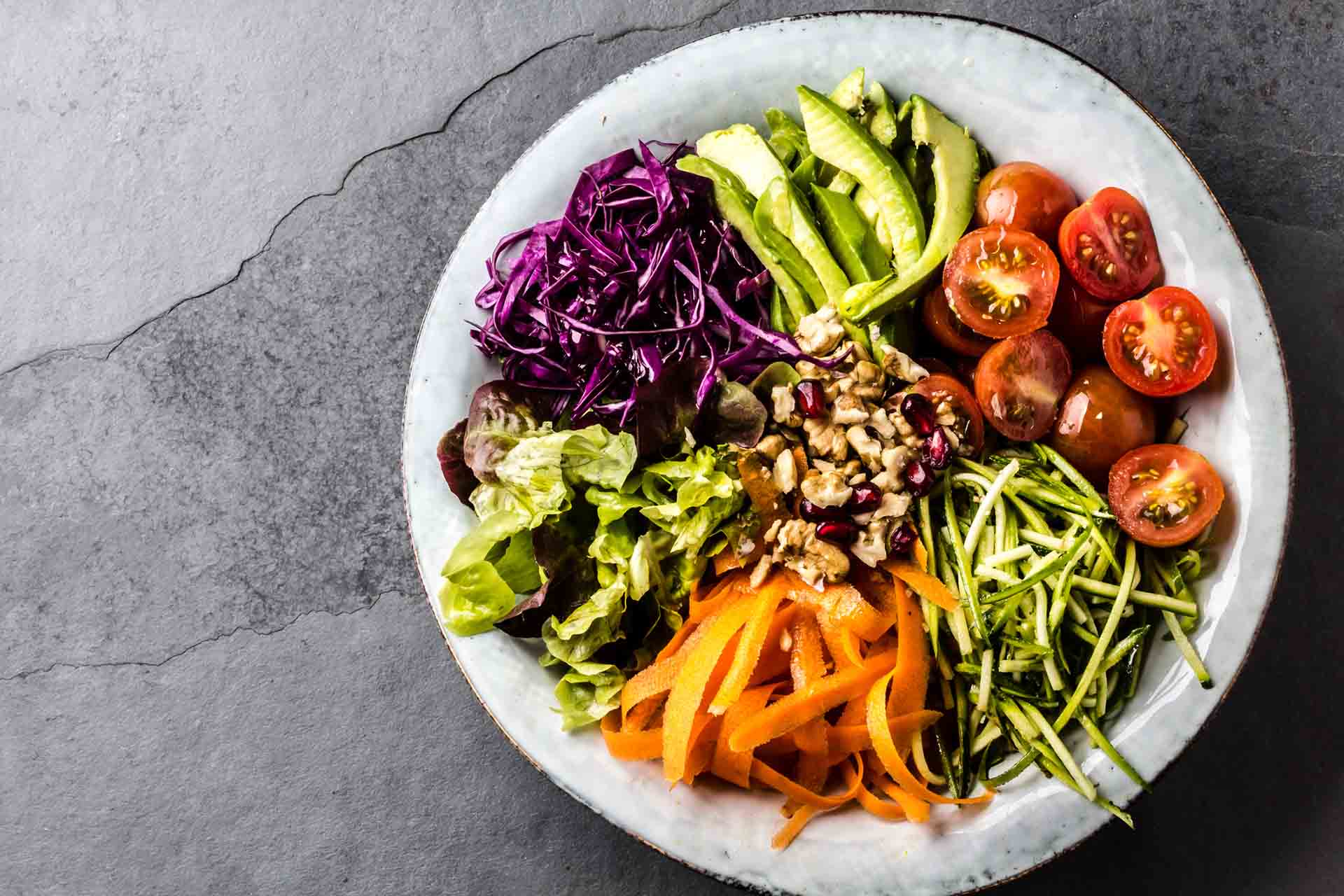Everything About Healthy Food: Benefits of Checking Out Plant Based Choices
The discussion bordering plant-based diets has gotten significant interest in current years. Lots of people are discovering the possible health advantages, nutritional benefits, and environmental influences related to these nutritional selections. As people end up being extra mindful of their food's impact on well-being and sustainability, concerns occur about the usefulness of embracing such a lifestyle. What particular modifications can one anticipate, and exactly how might these choices reshape not only individual health and wellness however likewise the earth's future?
Recognizing Plant-Based Diet Plans
Although lots of people connect plant-based diet regimens mainly with vegetarianism or veganism, these diet plans can incorporate a large range of consuming patterns that focus on entire, minimally refined plant foods. Such diet plans typically include fruits, vegetables, whole grains, seeds, nuts, and vegetables, while getting rid of or restricting pet items. This adaptability enables individuals to tailor their dietary choices according to dietary requirements and individual preferences. Some may embrace a primarily plant-based diet plan while still periodically consuming meat or milk, typically referred to as a flexitarian method. The focus remains on integrating more plant foods, which can cause a diverse range of dishes and tastes. Understanding these different analyses of plant-based consuming is crucial for valuing its accessibility and charm in contemporary food culture.
Wellness Conveniences of Plant-Based Foods
The wellness advantages of plant-based foods are substantial, using a nutrient thickness advantage that supports overall wellness. Research shows that these foods can boost heart health and play a necessary duty in reliable weight monitoring. By including extra plant-based choices, people may boost their dietary options and advertise long-term health and wellness.
Nutrient Thickness Advantage
Nutrient density plays an essential function in the health and wellness advantages of plant-based foods, making them an engaging selection for those seeking a well balanced diet regimen. Plant-based foods, such as fruits, vegetables, legumes, nuts, and entire grains, are typically abundant in essential vitamins, minerals, and antioxidants while being lower in calories. This high nutrient density permits people to consume less calories while still satisfying their nutritional requirements. In addition, these foods are packed with nutritional fiber, advertising digestive system health and assisting in weight administration. By integrating nutrient-dense plant-based choices, consumers can enhance their general wellness, support their immune systems, and minimize the danger of persistent conditions. Ultimately, the nutrient density of plant-based foods underscores their importance in a health-conscious way of living.
Heart Health Improvement

Weight Management Assistance
Along with advertising heart wellness, a plant-based diet plan can significantly aid in weight management. This nutritional method stresses entire foods such as fruits, vegetables, vegetables, nuts, and whole grains, which are normally lower in calories and greater in fiber compared to animal-based items. The high fiber material aids boost satiation, minimizing total calorie consumption. Plant-based diets are frequently rich in essential nutrients while low in undesirable fats, making it simpler to keep a healthy weight. Study shows that people that take on a plant-based lifestyle often tend to have lower body mass indexes (BMIs) and experience even more effective weight management compared to those that take in meat-heavy diet plans. Consequently, embracing plant-based alternatives is a strategic choice for effective weight monitoring
Nutritional Value of Plant-Based Ingredients
Plant-based active ingredients are abundant in essential nutrients, using a diverse variety of vitamins, minerals, and antioxidants that add to overall health and wellness. A comparison of protein resources exposes that while pet items are commonly seen as superior, several plant-based choices offer sufficient protein and other valuable compounds. Recognizing the nutritional worth of these ingredients can help people make educated dietary options.
Vital Nutrients in Plants
Nutrient-rich active ingredients found in plants provide a diverse array of vital nutrients that add greatly to general health and wellness. These active ingredients are abundant in vitamins A, C, and K, which support immune function, vision, and blood clot, specifically. On top of that, plants offer vital minerals such as calcium, potassium, and magnesium, critical for heart wellness, muscle mass feature, and bone toughness. The visibility of fiber in plant-based foods aids food digestion and advertises a healthy digestive tract microbiome. Antioxidants, discovered generously in fruits and veggies, aid combat oxidative stress and lower inflammation. Additionally, several plant foods are reduced in calories yet high in nutrients, making them an exceptional selection for those seeking to keep a healthy and balanced weight while ensuring suitable nutrient intake.
Comparing Protein Resources
Healthy protein resources vary significantly in their nutritional accounts, with plant-based components using distinct advantages. Unlike animal proteins, which typically include hydrogenated fats and cholesterol, plant proteins tend to be reduced in these harmful elements. Legumes, nuts, seeds, and whole grains are rich in important amino acids, fiber, vitamins, and minerals. For example, lentils give high healthy protein content together with considerable iron and folate, while quinoa is a total protein, offering all nine essential amino acids. In addition, plant-based healthy proteins are commonly come with by antioxidants and phytochemicals that support general wellness. The shift to plant-based healthy protein resources not only enhances nutritional intake yet additionally straightens with lasting dietary practices, decreasing environmental impact and promoting lasting wellness advantages.
Environmental Effect of Plant-Based Consuming
As awareness of environment modification grows, many individuals are checking out sustainable nutritional selections that can significantly reduce their environmental impact. Plant-based eating has actually become a considerable factor to reducing greenhouse gas exhausts, which are largely connected with animals manufacturing. The farming of fruits, veggies, vegetables, and grains commonly needs less sources, such as water and land, compared to animal farming. Furthermore, plant-based diet regimens can lead to decreased deforestation, as much less land is needed for grazing animals or expanding pet feed. By changing towards plant-based alternatives, customers can sustain biodiversity and promote healthier ecosystems. Generally, embracing plant-based consuming not only advantages individual wellness however likewise represents a crucial step towards ecological sustainability and conservation efforts.
Overcoming Common Misconceptions
While lots of individuals identify the advantages of a plant-based diet regimen, a number of false impressions usually hinder them from fully embracing this way of living. A typical idea is that plant-based diet regimens lack sufficient healthy protein; nevertheless, many plant sources, such as vegetables, nuts, and tofu, give enough protein. Additionally, some presume that this diet is expensive, when as a matter of fact, staples like beans, rice, and seasonal vegetables can be rather economical. An additional mistaken belief is that plant-based consuming is extremely limiting, whereas it in fact offers a diverse range of foods and tastes. Numerous stress that a plant-based diet might lead to shortages, yet with correct preparation, people can acquire all necessary nutrients, including vitamins and minerals, while enjoying a broad selection of delicious dishes. Vast Tips for Transitioning to a Plant-Based Way of living
Making the shift to a plant-based way of life can be an enriching experience, though it frequently requires some advice to navigate the preliminary modifications. Individuals are encouraged to start slowly, integrating even more fruits, veggies, beans, and entire grains into their dishes while minimizing meat and dairy consumption. Dish preparation is essential; preparing a regular food selection can assist reduce the change and protect against last-minute harmful options. Discovering cooking techniques and new dishes can also improve the experience and maintain enjoyment about plant-based eating. In addition, signing up with assistance groups or neighborhoods can offer inspiration and share useful pointers. Lastly, staying informed about More Info nourishment assurances balanced meals, preventing deficiencies while promoting a healthy, enjoyable plant-based way of life.
Delicious Plant-Based Meal Ideas
Exploring tasty plant-based meal ideas can inspire individuals to welcome a more healthy diet regimen. One prominent choice is a hearty quinoa salad, including cherry tomatoes, cucumber, and a zesty lemon-tahini clothing. An additional fave is a mouthwatering lentil stew, packed with carrots, celery, and fragrant natural herbs, best for a soothing dinner. For breakfast, over night oats made with almond milk, chia seeds, and covered with fresh berries supply a healthy our website start to the day. Furthermore, a dynamic vegetable stir-fry with tofu and a range of vibrant veggies can be a fast yet satisfying meal. Velvety avocado salute on whole-grain bread, sprayed with seasonings and seeds, supplies an easy yet delicious treat. These meals showcase the variety and splendor of plant-based consuming.

Often Asked Questions
Can a Plant-Based Diet Plan Offer Sufficient Healthy Protein?
The question of whether a plant-based diet regimen can supply adequate healthy protein is usual. Various resources, including vegetables, nuts, seeds, and entire grains, can meet healthy protein needs properly, sustaining a healthy and well balanced diet plan for people.
Are Plant-Based Diet Regimens Ideal for Kid?
The suitability of plant-based diet plans for youngsters depends on cautious planning. Ample nutrients must be guaranteed, consisting of minerals, vitamins, and healthy proteins. With proper support, such diets can sustain healthy and balanced development and advancement in children.
Exactly how Do I Eat Out on a Plant-Based Diet plan?
Eating in restaurants on a plant-based diet involves seeking restaurants with varied menus, requesting alterations, and exploring vegan-friendly choices. Planning in advance and interacting nutritional preferences can enhance the dining experience while maintaining nutritional choices.
What Are Common Irritants in Plant-Based Foods?
Usual irritants in plant-based foods consist of soy, gluten, nuts, and seeds - Plant Based Beef. People adhering to a plant-based diet regimen should understand these allergens and read labels very carefully to prevent negative responses and ensure risk-free consumption
Can Plant-Based Diets Aid With Fat Burning?
Research study suggests that adopting a plant-based diet regimen might promote fat burning as a result of its usually lower calorie density and greater fiber material. This combination can boost satiety, assisting individuals manage their caloric intake successfully. Several people associate plant-based diet regimens mainly with vegetarianism or veganism, these diet plans can incorporate a wide variety of eating patterns that prioritize entire, minimally refined plant foods. Nutrient density plays a crucial function in the wellness advantages of plant-based foods, making them an engaging option for those seeking a well balanced diet regimen. Plant-based diet regimens have been shown to markedly boost heart wellness, as they read the full info here often include components that support cardiovascular function. In addition to advertising heart wellness, a plant-based diet regimen can substantially aid in weight monitoring. An usual idea is that plant-based diets lack enough healthy protein; however, countless plant resources, such as legumes, nuts, and tofu, offer adequate healthy protein.